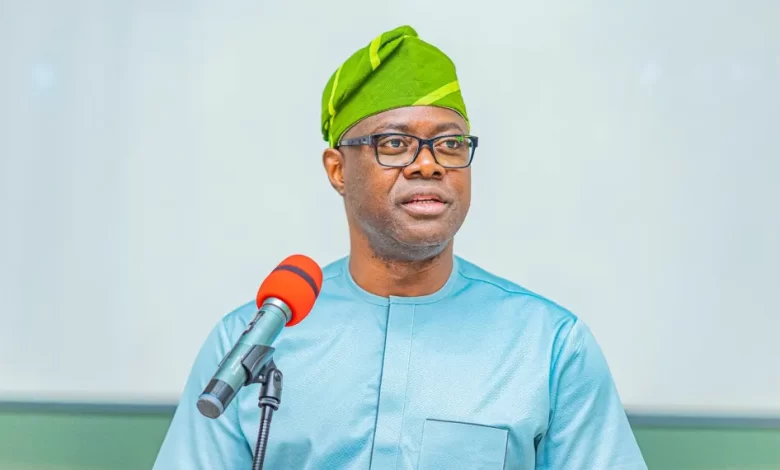Governors Restate Call For State Police At NBA Conference

On Monday, Seyi Makinde, the Governor of Oyo, alongside his counterparts in Ondo and Rivers states, Lucky Aiyedatiwa, and Siminalayi Fubara, restated their belief in the decentralization of the state police by the creation of state police.
But the Governor of Jigawa State, Umar Namadi, called for caution in the adoption of state police.
Aiyedatiwa and the governors, through their various representatives, spoke on Monday at the ongoing 64th Annual General Conference of the Nigerian Bar Association, held at Tafa Balewa Square in Lagos.
They spoke at a plenary session with the theme: “Is State Police a Solution to National Insecurity?”
In his submission, Aiyedatiwa asserted that the state police was a crucial step towards addressing the nation’s worsening security challenges.
“It is with a heavy heart, yet resolute determination, that this matter of utmost importance is discussed today. A decentralized security system that takes into account our diverse socio-cultural terrains and environmental peculiarities in the management of crimes is required,” Aiyedatiwa stated.
He referenced Section 14 (2) (b) of the 1999 Constitution, which stipulates that “The security and welfare of the people shall be the primary purpose of government,” and noted the collective inadequacies in fulfilling this responsibility.
Aiyedatiwa pointed out that it was the inadequacy of the federal policing system that led the South-West states to establish the regional security outfit named Amotekun.
The Ondo governor praised his predecessor, the late Governor Rotimi Akeredolu, (SAN), was the role he played in the creation of Amotekunm while he was the Chairman of the South-West Governors’ Forum.
Aiyedatiwa described Akeredolu as “a true visionary whose unwavering commitment to the safety and security of our people continues to inspire us all.”
“Remarkable achievements and unwavering resilience have been demonstrated by Amotekun corps.
“Amotekun may not be a cure to all the deep-seated issues that plague our nation, but it is a good starting point, a bold experiment, and a step in the right direction,” Aiyedatiwa said.
According to him, Amotekun corps have confronted terrorists, bandits, and kidnappers with unwavering courage and forged deep connections with communities.
He urged Nigerians to envision a future “where every state is empowered to tailor its security approaches to the unique needs of its people should be imagined.”
Makinde, who is the Deputy Chairman of Nigeria’s Governors Forum, was represented by a former Oyo State Attorney General and Commissioner for Justice, Prof. Oyelowo Oyewo (SAN).
He said given the state of insecurity in the country, the need to create the state police was urgent.
He pointed out that the inadequacy of the central policing was why the South-West states decided to form a regional security outfit known as Amotekun.
“It was as if we were to be run over by some army of occupation coming from the desert under the guise of climate change,” Oyewo remarked, criticizing the failure of federal security institutions at the time.
Buttressing the need for state police to complement the federal police, Makinde said,” The abduction of over 300 Chibok girls and the ongoing kidnappings across the country is evidence of the failure of policing and the security architecture.”
Dismissing the fear of abuse by state police, he remarked, “No scientific endeavor known is free from abuse. If science was to think of abuse, we would not move on.”
Similarly speaking, Rivers governor, Fubara, who was represented by the state’s Attorney General and Commissioner for Justice, Dagogo Eborama, noted the inefficiencies in tackling crime across Nigeria, especially in states facing frequent kidnappings and other violent crimes.
“Constitutionally, Nigeria is a federation. Can a central police, from top to bottom, effectively tackle crime in Nigeria? It cannot,” he declared.
He pointed out the United States as a model, noting that its multi-layered policing system allows for a more effective response to crime.
In his submission, the Jigawa State Governor, Namadi, represented by the state’s Attorney General, Mr. Bello Fanini, aligned with the call for a “multi-layered police” system but said it must be implemented with caution.
“The federal police are still needed. Why? Because of the dynamics of crime,” Namadi explained.
He also emphasized the importance of synergy between state and federal forces.



